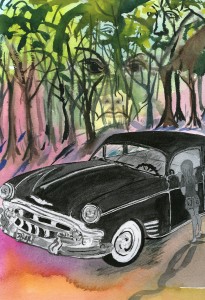 Robert Dugoni opened the Surrey conference I just attended. “On this day, I write,” was the ending phrase of his speech. If you’d like to hear it, please click here. It is inspirational. Thanks to Robert Dugoni, I began the conference reminded of why I write.
Robert Dugoni opened the Surrey conference I just attended. “On this day, I write,” was the ending phrase of his speech. If you’d like to hear it, please click here. It is inspirational. Thanks to Robert Dugoni, I began the conference reminded of why I write.
Thanks to Robert McCammon, and Robynn Sheahan, and Russell Turney, I left the conference reminded of why I write.
That’s what I’d like to talk about right now.
I wasn’t an outgoing child. In fact, I was very shy. At an early age, I learned to watch and listen, hoping to unlock the code that would make friendships easier to come by. I was always trying to understand why people did things–especially those things that hurt others. (I’m still trying to understand that.)
When I began writing poems under the hall nightlight, there’s no doubt the subjects were dark and worrisome. I wish I could see those early attempts again–the brooding of a deep-thinking nine-year-old–but I have searched. Alas, (doesn’t that sound poetic?) those pages must have found their way to the trash via year-end notebook guts, etc.
Anyhow . . .
Way back then, before I was in double digits, I didn’t think about how it would feel to write a best-seller. (Don’t get me wrong. I would love to have a best-seller.) I didn’t think about what it would be like to have my name on the cover of my own book, or how much money I could make, or how famous I could be, or any of the rewards.
I thought about what it might be like for a shy kid to be able to say what he or she wanted to. I wondered. What if the kid everyone ignored, could do something no one else could? And, what if I wanted to show that we are all special, likeable, even loveable.
As I got older, those objectives stayed the same, but I added some. Today, I write about the chubby girl, the homeless man, the woman with Down’s Syndrome. I write about people we don’t like, people we ignore, people we pity. I try to shed some imaginative light on who they are and why they are the way they are, all the while unfolding a story that grabs you and pulls you forward. My goal is revelation and suspense. And if the story I conceive begins with a five-year-old clairvoyant, I don’t say, “Nah, nevermind. Nobody’s gonna buy a story that starts with a five-year-old.” I write the story because it needs to be written.
I want to sell books just like everybody else, but I have to be true to my characters and my readers. If a child grows up hating the gift she’s born with, finds a way to make it stop, then desperately needs it back when her life falls apart, do you begin with her life falling apart? I don’t.
The reader must accompany the girl through some horrible situations, see both sides of “the gift,” or they can’t fully comprehend her dilemma. If the reader can’t decide whether or not the girl makes the right decisions, there’s no way they can go through the consequences with her.
I did not set out to write a thriller, although parts of this book are extremely intense. My main goal is that when you leave the story, you have heart-poundingly fallen in love with the character whose life has forced you to chew your nails.
This story is not about an event.
It is about a person.
I have to trust my writing, and the story, and the reader.
And, on this day, I do.


Wow. Well said. And I agree. Stop trying to make the story fit a mold it wasn’t meant to fit. Break the mold. Be the first to try something knew and daring. Well, maybe not daring, but outside of what is expected. You can do this. If anyone can, it’s you.
Robert McCammon said in his keynote speech “write from the heart, not the chart.”
By that he meant “don’t be an imitator. I sat in on one of his classes and he expanded on that comment in an aside. He despises imitators.
So be real to yourself, write from the heart, be the first, not the last.
On this day I write,
making words from thoughts
I have in my head that were born in my heart.
Paper and pen mark the way to ease my journey as I go.
This day I write anew
of things present and past
creating a window to allow future light.